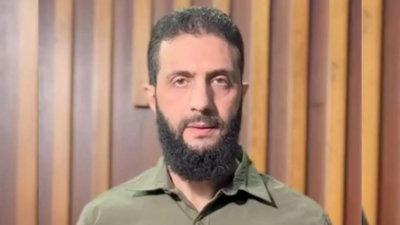
For years, Abu Mohammed al-Jolani was referred to as a shadowy determine main Syria’s department of Al-Qaeda. Because the founding father of the Al-Nusra Entrance (ANF), his group was synonymous with extremist ideology, brutal techniques, and a worldwide terrorist entity by america in 2013. But in the present day, Jolani is crafting a dramatically totally different picture, one which positions him as a practical chief of Syria’s insurgent stronghold.
Born Ahmed al-Sharaa in Damascus in 1982, Jolani’s roots are far faraway from the jihadist persona he later cultivated. Raised in Mazzeh, a rich district of the Syrian capital, he excelled academically and got here from a privileged background. Nevertheless, the post-9/11 period proved a turning level.
Drawn to jihadist ideology, he joined Al-Qaeda in Iraq, finally crossing paths with its notorious chief, Abu Musab al-Zarqawi.
In 2011, as Syria’s Arab Spring protests developed into civil struggle, Jolani returned to his homeland, founding the Al-Nusra Entrance. Below his management, the group pledged allegiance to Al-Qaeda, changing into probably the most harmful factions in Syria’s fragmented battle. Nevertheless, Jolani’s alignment with Al-Qaeda started to wane.
In 2016, he introduced that his group was breaking away from Al-Qaeda, rebranding the group as Jabhat Fath Al-Sham and later Hayat Tahrir al-Sham (HTS).
From extremist to politician
This shift marked the start of Jolani’s try to melt his picture. Whereas Western governments nonetheless classify HTS as a terrorist group, Jolani has taken steps to undertaking himself as a extra average determine.
The turban of his militant previous has been changed with army fatigues or easy khakis. His rhetoric has shifted from fiery jihadist speeches to political pragmatism.
In an effort to place HTS as a reputable governing pressure in rebel-held Idlib, Jolani oversaw the institution of a civilian administration, making a semblance of governance within the war-torn province. He has additionally sought to allay fears amongst minority communities, addressing Christians in Aleppo with guarantees of security and safety beneath HTS rule.
His look on CNN earlier this 12 months marked a definitive second in his rebranding journey. Jolani spoke of non-public evolution, saying, “An individual of their twenties may have a special persona than somebody of their thirties or forties. That is human nature.”
Many, nonetheless, view this transformation with suspicion, arguing it’s a calculated try to safe worldwide legitimacy.
A ‘pragmatic’ radical
Jolani’s management stays polarizing. Whereas he has distanced himself from Al-Qaeda and its international ambitions, HTS continues to face accusations of human rights abuses in its territories. Many have described Jolani as a “pragmatic radical” who adapts to the altering dynamics of Syria’s battle.
The offensive, which started with the shock seize of northern Aleppo, has shortly became a sequence of gorgeous victories for the rebels. Cities fell in fast succession as Assad’s forces failed to carry their floor. The strategic seize of Homs severed Damascus from the Alawite-dominated coastal area, the place Assad’s Russian allies keep vital air and naval bases.
Rebels staged a sudden advance, seizing the Syrian capital Damascus and ending Bashar al-Assad’s 24-year reign.